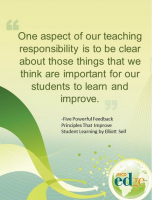As the time ticks away on this action plan blog post, I sit in front of my computer with an idea. Not a plan really just yet. Just a simmering in the back of my mind for a long time, nagging, can’t be ignored for too much longer, slowly percolating idea. But not a real plan. Yet.
Feedback.
It may as well be my achilles heel, my hamartia and my damocles sword all rolled into one. Feedback nags to the English teacher. Feedback can’t be ignored. Feedback demands to be heard. Feedback knows its importance and never misses a chance to remind us. When I take in yet another essay, accept another summative or ask for just one more metacognitive response, feedback winks at me obnoxiously. When a student arrives at my desk, wondering if I have marked her essay yet, feedback is standing there, arms crossed, looking VERY unimpressed. Every night that my exploding, overflowing marking bag arrives home, feedback tags along, always asking for an extra blanket, fresh mints on her pillow or a spot at the head of the table. Feedback is the house guest that has clearly overstayed her welcome. With all that being said, I recently read an article on the principles of good feedback and it resonated with me. It really is the backbone of my action research plan.
Learners need endless feedback more than they need endless teaching.

What will that look like? Endless feedback? Can my poor pink pens take it? Will my family be forced to order pizza yet again as I struggle under the weight of more essays? I want to explore how my feedback can become more timely, specific and targeted. Can I find a way to be more effective, provide more feedback but without so much sacrifice? I’m going to try!
What might it look like?
-Timely feedback with the use of technology such as google drive, kaizena, and socrative
-Peer reviews and a feedback process among my students
-Feedback that is kind, quick, specific and helpful
-Developing key elements of excellence so students know where the targets are
And that is why I’m fluffing the pillows, putting out the best china and inviting feedback for good.
“Can I find a way to be more effective, provide more feedback but without so much sacrifice? I’m going to try! ”
PLEASE share with the rest of us. What a wonderful avenue to explore for your Action Plan!
love your description of what great feedback looks like. the importance of maintaining sanity as a teacher is critical too!
I second Mardi’s comment: I am not so secretly excited to keep reading your blog to find out how to refine my own feedback initiatives.
I do want to share one thing with you. I had a colleague at Klingenstein share something similar to me and it blew my mind: he had students fill in a comment sheet, directing the teacher to what was really NEEDING feedback on this piece. The students could actually ask for feedback, say what they are proud of, and share what they noted were areas of concern.
I adopted it, or something similar to what this teacher created, and it has been useful for me to get a sense of how to focus my feedback in a way that will actually be useful for the students.
The comment sheet is on page three of this document I’m sharing with you, but feel free to steal any of what you read if you find it helpful!
https://drive.google.com/file/d/0B9vDCLDArV-saE1zcUNXT01pZTg/edit?usp=sharing
I have been extremely impressed with all of your blog entries, but this one really hit home with me. As a math teacher of many, many years, feedback is the one thing that we rarely give but which can make such a huge difference. Jo Boaler’s research in this area confirms what we know by intuition – regular feedback improves student achievement and retained learning much more than any other type of assessment or evaluation. Thanks for this, Danielle – you are an excellent role model.